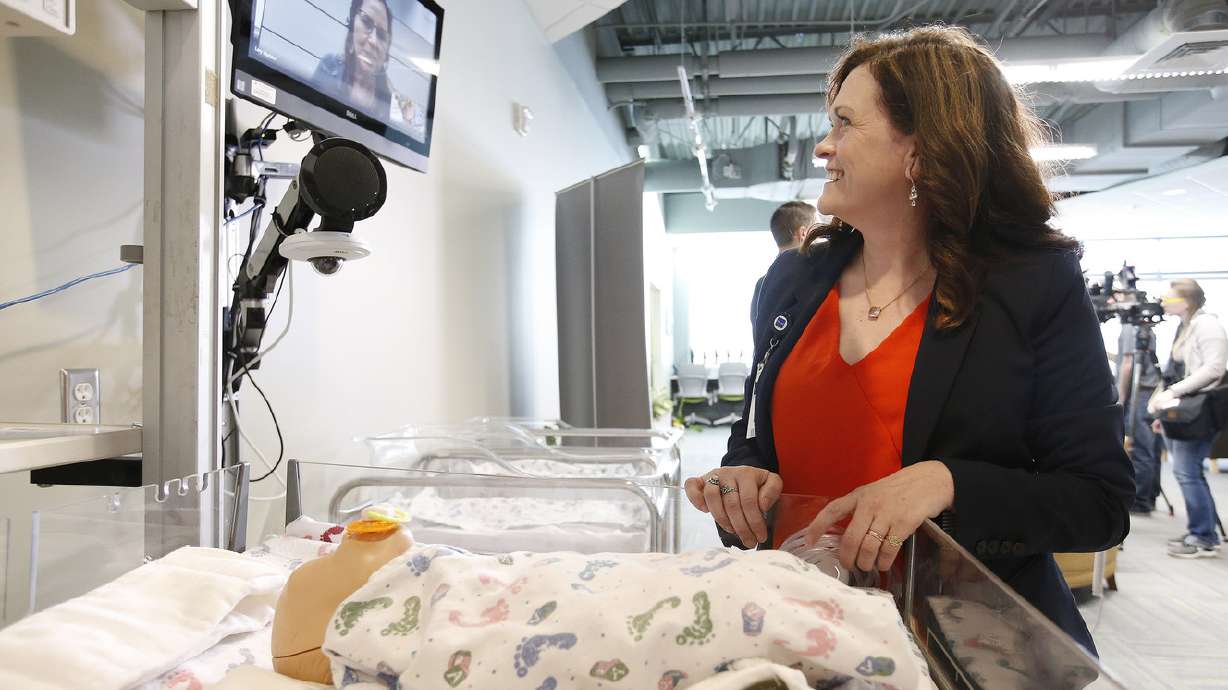Estimated read time: 4-5 minutes
This archived news story is available only for your personal, non-commercial use. Information in the story may be outdated or superseded by additional information. Reading or replaying the story in its archived form does not constitute a republication of the story.
MIDVALE — It's flu season, and you caught the cough that's going around. You throw on a pair of sweatpants and drive to an urgent care facility hoping a doctor will write you prescription for cough syrup.
Sitting in the waiting area, you watch more sick people sit down, settling in for the long haul. Finally, a nurse ushers you back, where a doctor talks to you for a few minutes and passes you that coveted prescription.
Four hours later, you're finally back at home in bed.
In 2018 this scenario, one familiar to many, can now be prevented thanks to Intermountain Healthcare's Connect Care Pro, one of the largest virtual hospital services in the U.S., health care officials say.
Though Intermountain has been providing virtual services for more than five years, all the services are uniting under Connect Care Pro to form a new virtual hospital in the Valley Center Tower in Murray, said Jim Sheets, vice president of outreach services for Intermountain Healthcare.
Through Connect Care Pro, Intermountain Healthcare can "export master clinicians that can provide services to some rural facilities that might not have access to them locally," Sheets explained as officials from the medical group met to announce the program's new name on Wednesday.
Intermountain Healthcare can offer off-site basic medical care and more advanced care, including stroke evaluation, intensive care, newborn critical care and mental health counseling.
"We really wanted to bring our critical care specialties and abilities to wherever the sick patients are. … We want to be intervening as soon as we can," said Dr. David Guidry, assistant medical director for TeleCritical care at Intermountain.
The "digitally enabled approach" saves time and money for both patients and clinicians. It also saves many patients from the burden of being transported to hospitals outside of their communities, the medical group officials said.
Related:
"A patient coming in that might be having a mental health crisis, whether they're in Richfield or Blanding or Star Valley, Wyoming, that they can come in and quickly get access to a psychiatrist or a crisis worker to help them work through that mental health issue," Sheets explained.
Health care experts from Intermountain demonstrated the way doctors can check in on patients in medical centers through video chat.
Patients can also chat with health care providers from anywhere at any time of the day using a smartphone, computer or tablet to treat minor issues including allergies, coughs, eye infections, joint pains and other problems. This costs $49 or less, depending on the issue.
"It's also very convenient for moms, dads," Sheets said.
"I've had five kids — wake up in the morning, and it's two in the morning, baby coughing with the croup. I don't want to take him to the emergency room, what do I do?" Sheets asked, illustrating how virtual visits can help families.
When Connect Care Pro experiences heavy traffic, patients wait for an average of seven minutes and chat with doctors for an average of 10 minutes, Sheets said.
The program also provides a Spanish translator, if needed.
However, for more serious issues, patients should go to the emergency room, health care officials say.
Intermountain Healthcare also has a kiosk located at the Columbus Library in South Salt Lake, an area with a high population of refugees. There, people can get help for minor health issues, and an interpreter is provided.
Currently, Intermountain Healthcare is trying to build awareness of the kiosk and is looking for more locations to place additional kiosks to serve other underserved areas, said Tim Lovell, business manager for Connect Care Pro.
Parents of newborns also benefit from Connect Care Pro, Sheets said.
Through video chat, neonatologists can walk local providers through newborn resuscitation. That way, babies in more rural areas often do not need to be rushed to far-away facilities.
Intermountain Healthcare has offered this service for about three years and has saved families of newborns about $150,000 so far, Sheets said.
Though at first there was "pushback" to the virtual service programs from some caregivers around the state, "we want to work very closely as a team and really as a consultant," Guidry said.
And over time, "we've developed really good relationships with our small hospitals, where they're calling us all the time and asking us questions," he added.
"This is very scalable," Sheets said. "It's leveraging this technology to provide those services." Email: aimlay@deseretnews.com Twitter: ashley_imlay









